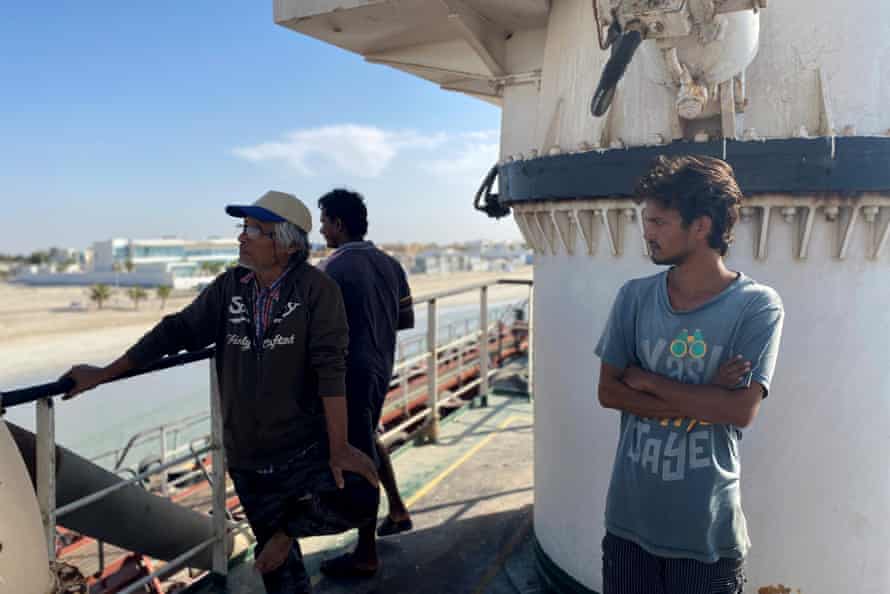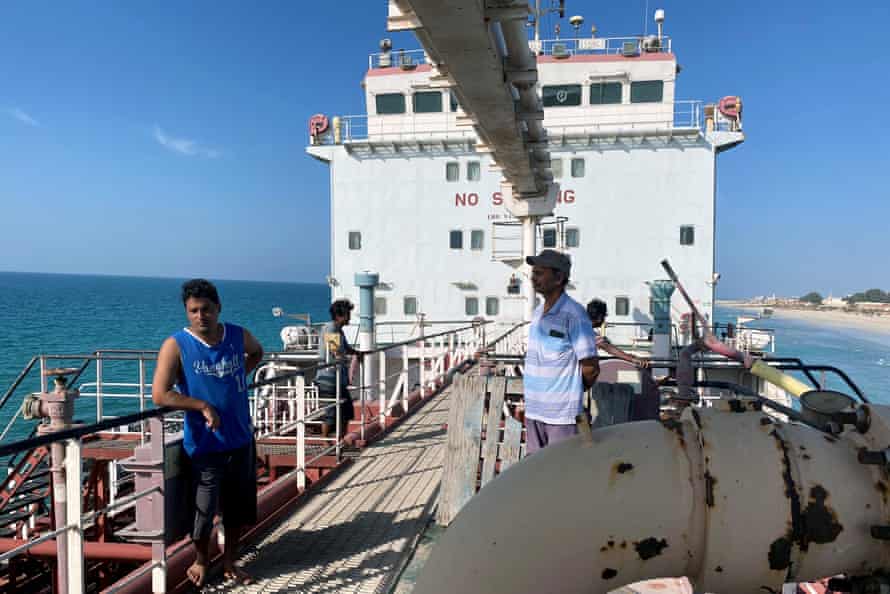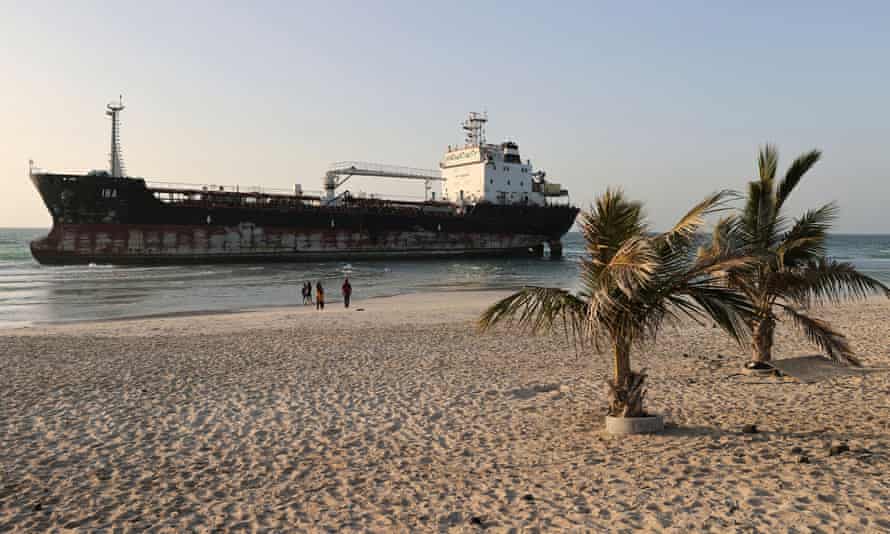Tourists are more accustomed to seeing kite surfers or kayaks off the idyllic coast of Umm Al Quwain, in the United Arab Emirates. But today they have gathered on sun loungers to sip coffee and gaze at the unusual sight of a 5,000-ton oil tanker grounded on the sand.
For the crew inside the Panama-flagged MT Iba, however, being grounded on the beach marks another harrowing chapter in an almost four-year ordeal at sea.
It is one of the worst cases of seafarer abandonment to come to light since that of Captain Ayyappan Swaminathan, whose 18-month plight on the MV Azraqmoiah cargo ship off the coast of the UAE was highlighted by the Guardian in 2019.
Abandoned by the vessel’s owner, their wages unpaid for 32 months, the five-person crew of the $4m (£2.8 million) Iba are in limbo. If they leave the ship they will lose their claim to the hundreds of dollars owed to them.
Nay Win, the 53-year-old chief engineer from Myanmar, who was contracted to work on the ship for a year in 2017, says the crew have endured “terrible suffering” and are desperately worried about their families. “I cannot send wages to support my family, my children cannot study, they cannot eat, they have to borrow money.”
Win, whose wife Naing Naing Maw, daughter Eyi Myat Mon, 17, and son, Lwin Moe Aung, 21, live in a country in the midst of a military coup, says: “I am worried for my family, about Covid-19 and the political situation. I told them, stay at home, don’t go outside.”
What began as a normal seafaring job turned into a “living hell”, the men say, after the tanker’s owner, Alco Shipping, once one of the UAE’s largest shipping firms, ran into financial difficulty and stopped paying salaries almost three years ago. Since then they have been forced to rely on charities for food and water.

Speaking to the Guardian via WhatsApp, Win says he has had to cancel university education for his children and cannot afford medical bills for his daughter, who has heart problems.
Win and Riasat Ali, 52, a second engineer from Pakistan, have been on board since July 2017. Monchand Sheikh, 26, a cook from India, joined in late 2018, while Vinay Kumar, 31, another second engineer, and Nirmal Singh-Bora, 22, both from India, joined in late 2019.
In January, the vessel, which is almost out of fuel, broke two anchors in rough seas in Al Hamriya Port, just north of Dubai. The crew spent a terrifying 12 hours as the Iba listed at an angle of 45 degrees and began drifting in the busy waters of the Gulf, before finally running aground on the sand, metres from the beach.
“I informed the owner the anchor chain could break anytime, but he does not care,” says Win.
“We’ve seen hell during this voyage,” Kumar, a father of two, says. “Every day we prayed, it was our only hope,” he told the National, a UAE newspaper.
The crew are owed $230,000 (£170,000) in unpaid wages, the seafarers say. Alco Shipping was blacklisted by the Indian government in 2018 due to abandonment cases.
If the crew set foot on land, they risk being detained for not having the right documents. Win’s passport, which expired while he has been at sea, remains with his former employer. And with a military coup at home, it is unclear how he will get a new one. Furthermore, international law prohibits “ghost ships” at sea without crew because they are a safety hazard.
Cases of seafarer abandonment are at a record high, exacerbated by the coronavirus pandemic, the International Maritime Organization (IMO) has said. Hotspots for abandonment are the Middle East and Asia, with the UAE top of the list in 2020, followed by China, Taiwan, Turkey and Italy. Liberia, Malta and Panama were the flag states with the most cases last year, IMO and International Labour Organization data showed.
Mohamed Arrachedi, Arab world and Iran network coordinator for the International Transport Workers’ Federation (ITF), says that while many abandonment cases can be resolved quickly, some take longer for a variety of reasons, including a lack of cooperation from owners and no insurance on board to cover the seafarers.
“It is unacceptable that seafarers are kept as hostages on ships for such a long time, and their wellbeing and rights are ignored,” Arrachedi says. “The seafarers should be at the heart and centre of action in abandonment cases.”

The Mission to Seafarers, which dropped food to the men last month, hopes negotiations to repatriate the crew can be concluded soon. The Rev Andy Bowerman, the charity’s regional director in the Middle East and south Asia, says the contrast between the tourists on the beach and the crew is stark. “People go and sit on deckchairs on the beach and take coffee and look at them. It’s a bizarre situation. But these are real people in a real situation.”
“We were hoping that once they got beached, [this] would be resolved more quickly,” says Bowerman, who is helping to mediate negotiations between Alco and the crew.
“But it’s been two and a half weeks. The authorities need to think very carefully about how this is perceived by the wider world. These men have had to stay on a ship, unpaid, relying on charities for food and water. If there was strong maritime legislation in place this ship would be arrested and put out to auction almost immediately.”
Following another abandonment case highlighted by the Guardian in 2019, the UAE said a law to seize abandoned ships was under discussion. In 2018, the country brought in regulations similar to a maritime labour convention amendment, which require vessels to carry insurance, so that abandoned seafarers get paid up to four months’ wages. But it came too late for the Iba seafarers, who were abandoned in 2017.

Syed Waqar Hasan has taken over operations of Alco Shipping, in the absence of his brother, the ship’s owner Syed Ijaz Hasan, who was imprisoned in 2017 for financial crimes.
“I’m trying to solve the problem,” Waqar Hasan tells the Guardian. “I feel sympathy for the crew but my hands are tied. There is no money in Alco Shipping. It was made bankrupt.”
He says: “It’s complicated. The Iba is mortgaged to the bank. There are so many outstanding debts. The crew, the salaries are piling up. But we have one buyer for the Iba.”
The buyer is willing to pay the crew $142,000 in owed salaries, plus $8,000 in repatriation costs, he says. But it is unclear if the seafarers will accept. The vessel is worth $4m, Waqar Hasan says, but its debts to the port authority, banks and others amount to $1.95m.
The Guardian has approached the UAE’s Federal Transport Authority for comment.
The Link LonkFebruary 15, 2021 at 01:00PM
https://ift.tt/3qyOahe
Four years at sea, now just metres from shore: 'living hell' of stranded UAE ship - The Guardian
https://ift.tt/2CoSmg4
Sea
/cloudfront-us-east-2.images.arcpublishing.com/reuters/CZF6NULMVVMEXHOP7JK5BSPQUM.jpg)
No comments:
Post a Comment